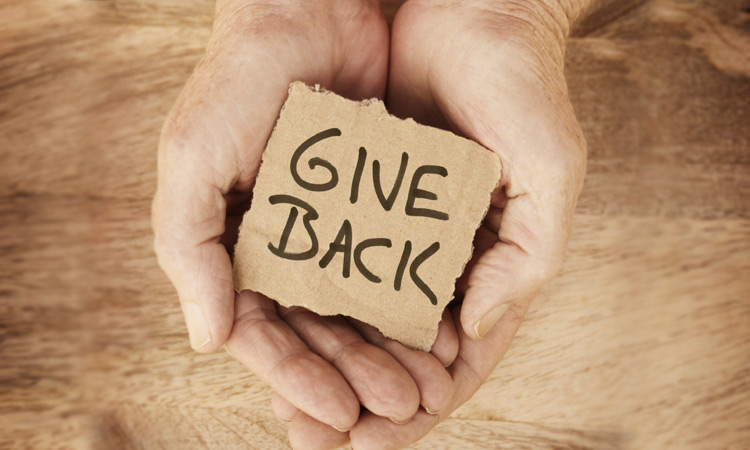On Thanksgiving we often share time and a meal with loved ones, giving thanks for our bounty. The holiday can also inspire us to help those less fortunate, year-round. Locally, we can reach out to friends and strangers in simple ways to convey a sense of community spirit. On a global scale, we can contribute to a better world through a cause that’s meaningful to us.
Reach out in your community
From sharing a smile, meal, listening ear, or word of understanding with a friend or stranger, each of these acts can change someone’s day. Donating used furniture, clothing or toys to a shelter; standing up for someone who’s been abused; and offering someone temporary shelter are other significant ways to give back to people in our community.
Dale Guffey, a communications instructor at Cleveland Community College, started a kindness experiment at her workplace. In a women’s restroom, she placed a vase of flowers; a sign saying “Take What You Need,” with pull tabs for “Love,” “Joy,” “Peace,” etc;” a bowl of candy; and hand lotion.
Guffey also left post-it notes and pens next to a sign that explains, in part: “When people are unexpectedly kind to me my day goes better. I smile more. I’m more patient, and I’m just generally nicer to people. I hope that they are then nicer to people around them, and in that way, the circle widens.” By month’s end, the wall surrounding the note was covered in post-its with kind thoughts and thank you’s for the treats.
Guffey also placed a box where people left small items for women and children at a local shelter. Alternatively, as the sign suggested, some took certain items they needed.
Since she started this experiment, Guffey says, “The restroom is cleaner, people definitely appreciate the effort, and I’ve learned from some of the notes just how tough things are for some of our students who are in rough situations.”
In fact, a scientific study, supports this idea that altruistic behavior can be contagious.
Help our world
With the constant flow of tragic news in our world, it’s difficult to stay optimistic about our ability to affect wide-reaching change. Yet we can still make a small but real impact on global issues. Give blood, become a donor, or fight for a cause through political action. Make a monetary donation, or raise money and participate in a walk or race for your favorite charity. Volunteer time to a charity you support.
Through a club called Interact—a branch of the international leadership and service organization, Rotary—high school students help on both local and global levels. Interact is fully organized and run by students across the country, who choose their local and international service projects each year.
Annalicia Anaya, a high school senior, is the Director of Area 9 and represents Interact activities for nine schools in Northern California.
Anaya works on both local and international projects, and says, “There is no better feeling than the one that overwhelms one’s soul after leaving an after-school tutoring center where kids are provided with the educational support that they so desperately desire.”
Anaya adds, “If there’s any feeling that can compare with that, it is the feeling of bliss after working hard to raise money that will be sent to aid an African family, or an individual freed from the bondage of human trafficking.”
Giving benefits the giver
Of her most rewarding experiences with Interact, Anaya says, “It is during moments like these that I am reassured that service is the ultimate outlet for me to find the most genuine joy.”
Even beyond the pleasure of helping others, generosity provides unexpected benefits to the giver. Giving makes us physically and mentally healthier by boosting our immune system, reducing our stress, and increasing self-esteem, creating empathy for fellow human beings and making us generally happier and more optimistic.
Studies show giving may decrease depression, reduce chronic pain, even lower mortality rates. It can also provide us a sense of purpose. Giving increases the likelihood of political and social engagement, creating the potential for a better society.
In fact, one study shows a direct, positive correlation between the amount of happiness enjoyed by people who give directly to friends or community members, as opposed to anonymous charitable donations, because of the social connections involved.
The study concludes, “Similarly, our findings suggest that charities should strive to increase the interpersonal connection between donors and beneficiaries, such that donors experience an emotional boost from giving.”
When we see suffering in the lives of those around us, particularly those far away, sometimes we may feel hopeless to affect any change. But we can make Thanksgiving a time to start new traditions of kindness, realizing that kindness is contagious and giving in small ways can make a difference.
Click here to see Rose’s tips for healthy and happy relationships

